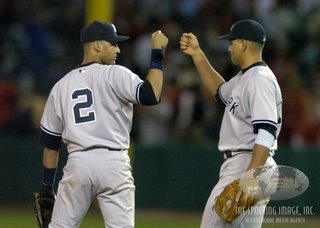
The New York Times
Published: November 23, 2006
Derek Jeter lost the American League Most Valuable Player award this week to Justin Morneau, one year after Alex Rodriguez outpolled the most notorious Yankee killer of the 21st century.
A-Rod, fall guy for Yankees fans, beats out David Ortiz of the hated Red Sox, but Jeter, Mr. October and November, comes up short against Morneau, a Minnesota Twin. How, exactly, do we who claim to understand the proper order of all things Yankee explain this breach of common baseball sense that anoints A-Rod, not Jeter, as an M.V.P.?
Tuesday’s decision for Morneau, hardly outrageous or even an egregious example of anti-New York bias by any objective examination of the numbers, speaks more to the ecological imbalance that has befallen the Yankees in the six years since their last World Series was won.
Here at the onset of the hot-stove season comes another chilly reminder that the Yankees don’t spin on their axis the way they once did. There is always some wobble at the end of their rotation.
If you have been paying attention for the past 11 years, if you understand the symbiosis of Jeter’s relationship with his manager, Joe Torre, then you know how badly the organization wanted Jeter to win his first M.V.P. award, probably more than Jeter wished it for himself.
The years pass, the failures mount, but Jeter remains the standard of excellence, the embodiment of all those team-first intangibles the Yankees would have us believe were invented in the Bronx. Jeter may be alone someday, with Bernie Williams possibly exiting the stage soon, leaving him, Mariano Rivera and Jorge Posada as the true-blue ring bearers among the wealthy and winless, the clubhouse wing most epitomized by A-Rod and the richest contract in the history of the sport.
He, of course, sacrificed his natural position, shortstop, to be a Yankee, to play alongside Jeter, but has spent the past three years trying to reach Jeter’s champion’s perch. A-Rod climbs and climbs, inflating his Hall of Fame statistics along the way, only to stumble over himself and roll back down the hill at the end of the season.
He was not the only Yankee to flame out this fall, but how surprising, in retrospect, was his 1-for-14 division series against Detroit after all those advance alibis in Sports Illustrated? Was it really so unreasonable for an exasperated Torre to throw up his hands and bat A-Rod a humiliating eighth in Game 4?
Quickly, the Yankees squelched inevitable speculation that they had had enough and were ready to send A-Rod away, if only he would agree to go. He and his agent, Scott Boras, insist he doesn’t want out of New York. That he loves being here. With Gary Sheffield and his right-handed power bat gone, A-Rod probably has to be. But does he really buy into this whole Yankee thing, or did he come to New York “to be Mr. Madison Ave.” — as his marketing representative, Steve Fortunato, told USA Today last June?
•
Corny as it all may seem, scripted as Jeter can sound, he typically puts the best franchise face forward. At a memorial service last month in California several days after pitcher Cory Lidle’s death in a Manhattan plane crash, there was Jeter, right alongside Torre. Where was Rodriguez? He is not the manager, or the captain, as is Jeter, but what about his alleged standing as the team’s reigning superstar, its most scrutinized player, A-lightning-Rod?
Too many times — as with the Sports Illustrated confessional on the eve of the playoffs — Rodriguez seems to miss the impact of his actions, or inaction.
Last Wednesday, after attending his own charity poker tournament in Manhattan, he canceled on a major fund-raiser the next night at the Yogi Berra Museum in Little Falls, N.J. According to a person in the Rodriguez camp who spoke yesterday on condition of anonymity, A-Rod’s mother, Lourdes, had suddenly been hospitalized — certainly a legitimate excuse and far better than the reason David Wright’s people gave for him not showing. (Wright had been inadvertently double-booked that night.)
But Wright is a Met, A-Rod a Yankee, and because he has a history around town of blowing off events (including one of Torre’s last year), because the call to the museum to cancel was made not by Rodriguez but by one of his employees, because there was an A-Rod sighting last Friday night at courtside of the Knicks-Heat game in Miami, the museum people and the Berra family and even the Yankees’ president, Randy Levine, were said to be in a snit, with the impression that A-Rod too often gives: he just doesn’t get it.
A personal call to Berra a day or two or even three after the event is all it would have taken to deliver an expression of sincerity, to let Berra and the Yankees know that A-Rod does respect the tradition, the legacy and, in this case, the patriarchal standing of Berra, 81, as the greatest living Yankee.
Raw power may make you a most valuable player, but A-Rod, as talented and hard-working as he is, still hasn’t mastered the subtleties of team interaction, the intangibles that postseason awards typically don’t address. Without them, there is no way for A-Rod to reach the pedestal on which Jeter still stands.
E-mail: hjaraton@nytimes.com
No comments:
Post a Comment